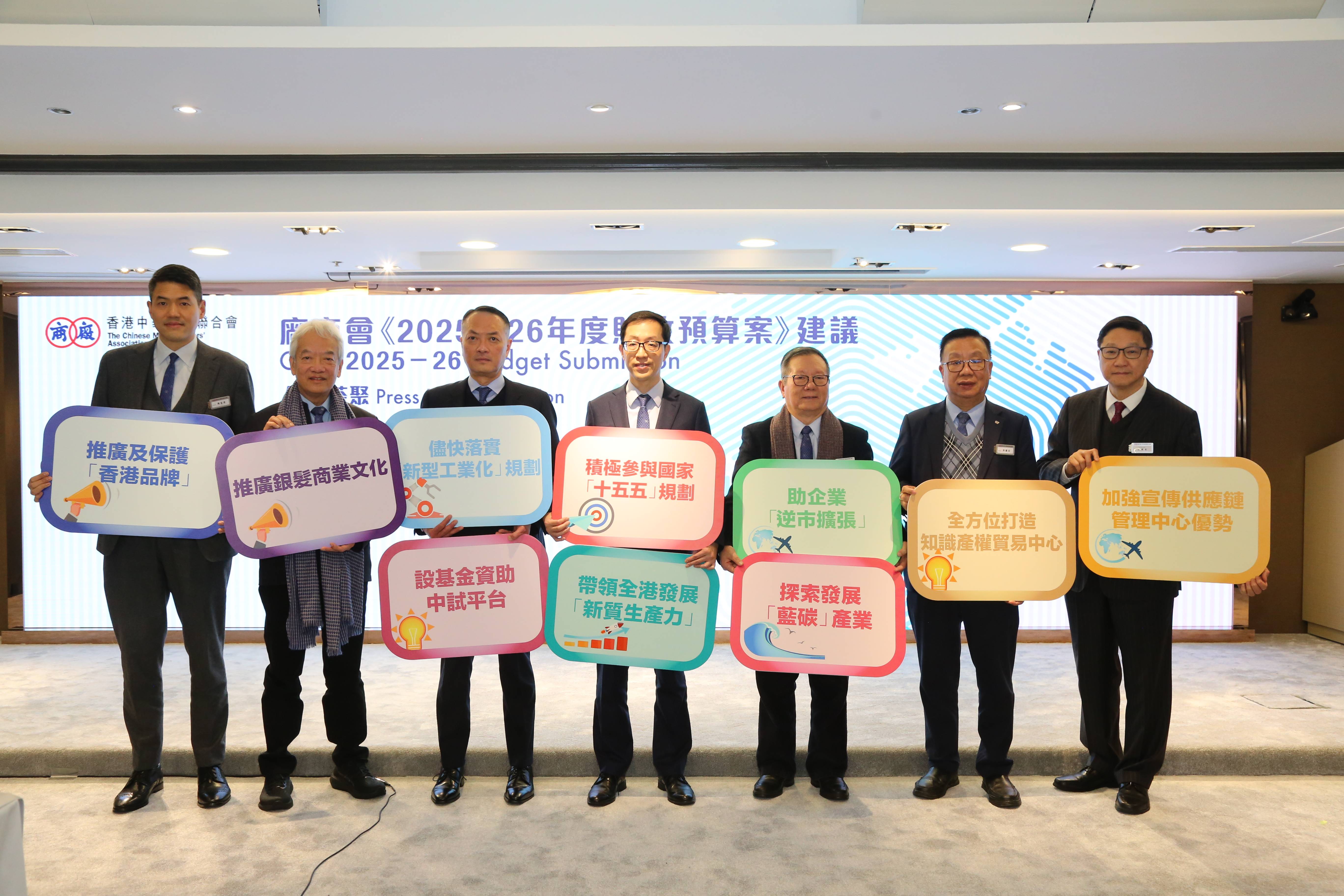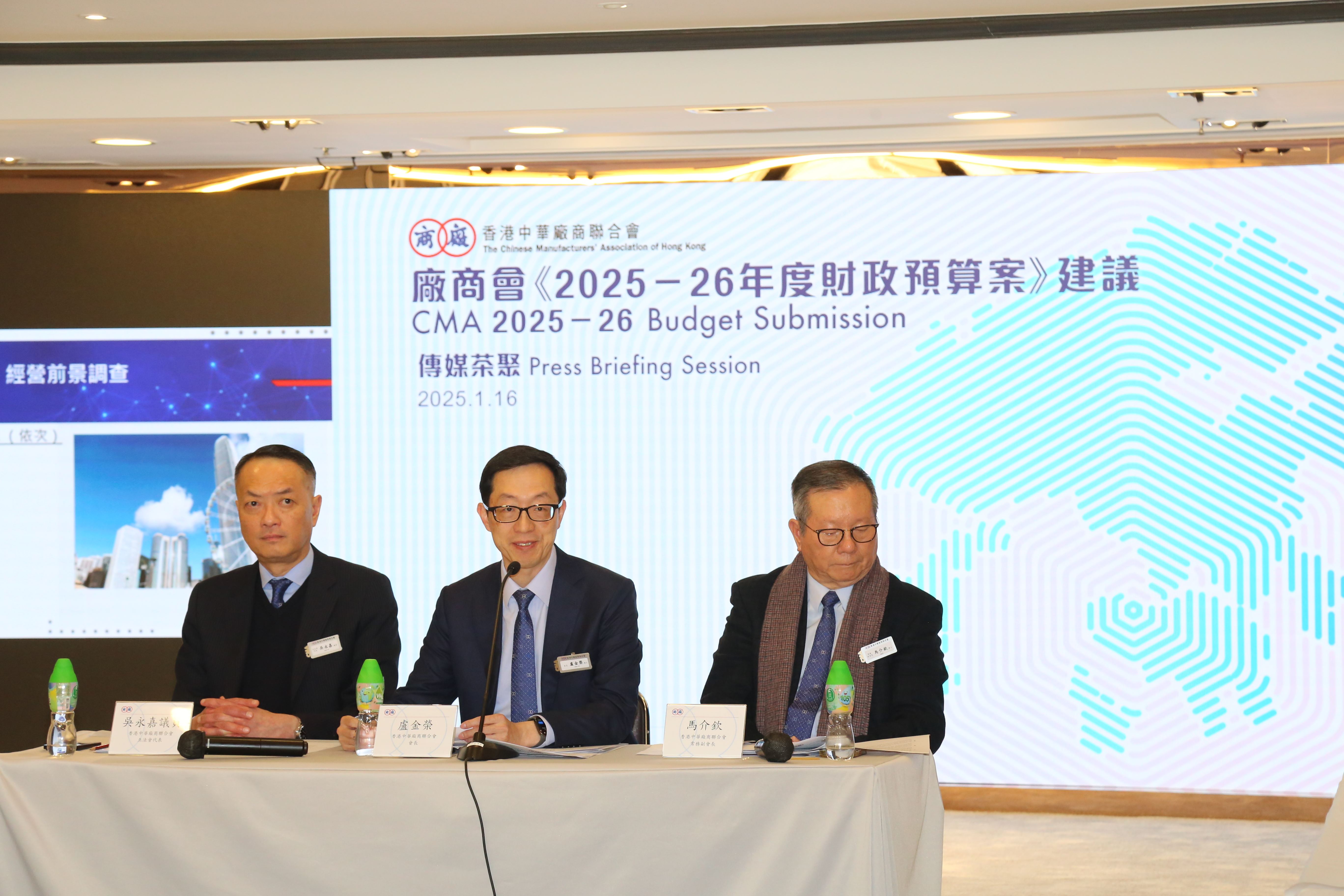The CMA Submits Recommendations for the 2025-26 Budget:
Supporting Enterprises and Igniting Economic Growth
The Chinese Manufacturers’ Association of Hong Kong (the CMA) has submitted a proposal to the Hong Kong SAR Government for the 2025-26 Budget, outlining around 90 recommendations designed to support businesses, foster “new quality productive forces”, consolidate Hong Kong’s strengths, and drive economic growth.
During a media briefing today (16 January), Dr Wingco Lo, President of the CMA, elaborated on these recommendations. While acknowledging the government’s current fiscal deficit, he emphasised that Hong Kong is at a pivotal stage of economic transformation. Dr Lo stated, “It is essential to continue supporting enterprises in overcoming challenges and injecting momentum into economic growth while balancing the needs for social stability and Hong Kong’s long-term development.”
Strengthening support for enterprises
To enhance support for businesses, Dr Lo referenced an internal CMA survey indicating that, despite numerous challenges, enterprises remain proactive in exploring diverse markets and are eager for increased fiscal and tax support from the government. The CMA recommends extending the principal moratorium arrangement to allow businesses to defer principal repayments for a longer period and enhancing the SME Financing Guarantee Scheme by broadening fee waivers and lowering the interest rate cap. Additionally, the CMA suggests relaxing wage-related restrictions in the Enhanced Supplementary Labour Scheme by removing rigid requirements tied to median wages. Other recommendations include raising the funding cap for enterprises under the SME Export Marketing Fund, introducing a “revolving approval” mechanism, and extending special measures covering local market for an additional three years.
Accelerating “new quality productive forces”
In its emphasis on accelerating “new-quality productive forces,” the CMA highlighted the critical role of manufacturing. It proposed that, in addition to nurturing emerging and future industries, the government should focus on upgrading traditional industries and supporting, “new, distinctive, specialised, and sophisticated” small and medium-sized enterprises. To facilitate this, the CMA recommends launching a pilot industrial park in the Northern Metropolis, concentrating on developing one identified emerging industry and one identified traditional advantageous industry. To enhance the commercialisation of local research and development (R&D) outcomes, the CMA suggests establishing a matching fund to subsidise non-profit organisations operating pilot production platforms in the Hong Kong-Shenzhen Innovation and Technology Park. Furthermore, the CMA proposes implementing a mandatory procurement policy for pilot production services in government-funded projects to expedite the development of this sector in the city.
Consolidating Hong Kong’s status as an international trade centre
CMA’s survey identified geopolitical risks as the second-largest challenge faced by local businesses, threatening the city’s status as a trade hub. CMA Legislative Council Representative Mr Jimmy Ng recommended resuming a rapid communication mechanism between the government and trade associations to address escalating Sino-U.S. trade tensions. He also suggested that the government sign more bilateral free trade agreements with other economies and establish offices in more emerging markets to help Hong Kong businesses mitigate risks and seize opportunities. To further enhance Hong Kong’s position as a trade hub, the CMA proposed strategies to strengthen its role as a multinational supply chain management centre, including forming dedicated missions to attract investors and promote Hong Kong’s strengths in value-added supply chain services. A one-stop service platform should also be established to support Hong Kong businesses in relocating high-value R&D and production activities back to the city.
Stimulating new growth drivers
In addition to consolidating existing strengths, the CMA advocates for initiatives to stimulate new growth drivers. These initiatives include promoting the silver economy and industrial tourism, exploring opportunities in blue carbon development, establishing Hong Kong as a regional intellectual property trading centre, supporting Hong Kong-funded enterprises outside the SAR, and enhancing the promotion of “Hong Kong brands.” CMA Executive Vice President Dr Warren Ma emphasised that Hong Kong-funded manufacturers in the Mainland are a vital component of the city’s new industrialisation efforts. He proposed that the Hong Kong Export Credit Insurance Corporation expand its coverage for businesses operating in the Mainland. Dr Ma also called for the unification of Greater Bay Area standards, Mainland customs clearance standards, and market access requirements. For products meeting Greater Bay Area standards, he urged more relaxed customs and clearance arrangements to facilitate market entry. Additionally, the CMA recommends establishing permanent “Hong Kong Brand Galleries” on Mainland and international e-commerce platforms and creating a certification system for “Hong Kong brands” to enhance brand protection and market recognition globally.
As the preliminary research and planning for the national 15th Five-Year Plan have commenced, the CMA suggests that the Hong Kong SAR Government establish a dedicated task force under the Steering Group on Integration into National Development. This task force would propose specific policies for aligning with the national plan and encourage broader participation and discussion across various sectors to fully integrate Hong Kong into the country’s development framework.
Other office-bearers of the CMA attending the media briefing included Professor Simon Wong, Mr Dennis Ng Kwok On, Mr Calvin Chan, and Dr Ellis Wong; Vice Presidents; and Mr William Chui, Chief Executive Officer.
Encls:
During a media briefing today (16 January), Dr Wingco Lo, President of the CMA, elaborated on these recommendations. While acknowledging the government’s current fiscal deficit, he emphasised that Hong Kong is at a pivotal stage of economic transformation. Dr Lo stated, “It is essential to continue supporting enterprises in overcoming challenges and injecting momentum into economic growth while balancing the needs for social stability and Hong Kong’s long-term development.”
Strengthening support for enterprises
To enhance support for businesses, Dr Lo referenced an internal CMA survey indicating that, despite numerous challenges, enterprises remain proactive in exploring diverse markets and are eager for increased fiscal and tax support from the government. The CMA recommends extending the principal moratorium arrangement to allow businesses to defer principal repayments for a longer period and enhancing the SME Financing Guarantee Scheme by broadening fee waivers and lowering the interest rate cap. Additionally, the CMA suggests relaxing wage-related restrictions in the Enhanced Supplementary Labour Scheme by removing rigid requirements tied to median wages. Other recommendations include raising the funding cap for enterprises under the SME Export Marketing Fund, introducing a “revolving approval” mechanism, and extending special measures covering local market for an additional three years.
Accelerating “new quality productive forces”
In its emphasis on accelerating “new-quality productive forces,” the CMA highlighted the critical role of manufacturing. It proposed that, in addition to nurturing emerging and future industries, the government should focus on upgrading traditional industries and supporting, “new, distinctive, specialised, and sophisticated” small and medium-sized enterprises. To facilitate this, the CMA recommends launching a pilot industrial park in the Northern Metropolis, concentrating on developing one identified emerging industry and one identified traditional advantageous industry. To enhance the commercialisation of local research and development (R&D) outcomes, the CMA suggests establishing a matching fund to subsidise non-profit organisations operating pilot production platforms in the Hong Kong-Shenzhen Innovation and Technology Park. Furthermore, the CMA proposes implementing a mandatory procurement policy for pilot production services in government-funded projects to expedite the development of this sector in the city.
Consolidating Hong Kong’s status as an international trade centre
CMA’s survey identified geopolitical risks as the second-largest challenge faced by local businesses, threatening the city’s status as a trade hub. CMA Legislative Council Representative Mr Jimmy Ng recommended resuming a rapid communication mechanism between the government and trade associations to address escalating Sino-U.S. trade tensions. He also suggested that the government sign more bilateral free trade agreements with other economies and establish offices in more emerging markets to help Hong Kong businesses mitigate risks and seize opportunities. To further enhance Hong Kong’s position as a trade hub, the CMA proposed strategies to strengthen its role as a multinational supply chain management centre, including forming dedicated missions to attract investors and promote Hong Kong’s strengths in value-added supply chain services. A one-stop service platform should also be established to support Hong Kong businesses in relocating high-value R&D and production activities back to the city.
Stimulating new growth drivers
In addition to consolidating existing strengths, the CMA advocates for initiatives to stimulate new growth drivers. These initiatives include promoting the silver economy and industrial tourism, exploring opportunities in blue carbon development, establishing Hong Kong as a regional intellectual property trading centre, supporting Hong Kong-funded enterprises outside the SAR, and enhancing the promotion of “Hong Kong brands.” CMA Executive Vice President Dr Warren Ma emphasised that Hong Kong-funded manufacturers in the Mainland are a vital component of the city’s new industrialisation efforts. He proposed that the Hong Kong Export Credit Insurance Corporation expand its coverage for businesses operating in the Mainland. Dr Ma also called for the unification of Greater Bay Area standards, Mainland customs clearance standards, and market access requirements. For products meeting Greater Bay Area standards, he urged more relaxed customs and clearance arrangements to facilitate market entry. Additionally, the CMA recommends establishing permanent “Hong Kong Brand Galleries” on Mainland and international e-commerce platforms and creating a certification system for “Hong Kong brands” to enhance brand protection and market recognition globally.
As the preliminary research and planning for the national 15th Five-Year Plan have commenced, the CMA suggests that the Hong Kong SAR Government establish a dedicated task force under the Steering Group on Integration into National Development. This task force would propose specific policies for aligning with the national plan and encourage broader participation and discussion across various sectors to fully integrate Hong Kong into the country’s development framework.
Other office-bearers of the CMA attending the media briefing included Professor Simon Wong, Mr Dennis Ng Kwok On, Mr Calvin Chan, and Dr Ellis Wong; Vice Presidents; and Mr William Chui, Chief Executive Officer.
Encls:

The CMA has submitted its policy recommendations for the 2025–26 Budget, offering around 90 suggestions (from the left: Mr Calvin Chan, Professor Simon Wong; Vice Presidents; Mr Jimmy Ng, CMA Legislative Council Representative; Dr Wingco Lo, President; Dr Warren Ma, Executive Vice President; Mr Dennis Ng Kwok On, Vice President; and Mr William Chui, Chief Executive Officer)

Dr Wingco Lo (centre), President of the CMA, emphasised that Hong Kong is at a critical point of economic transformation, and it is essential for the government to continue supporting businesses and injecting momentum into the economy
